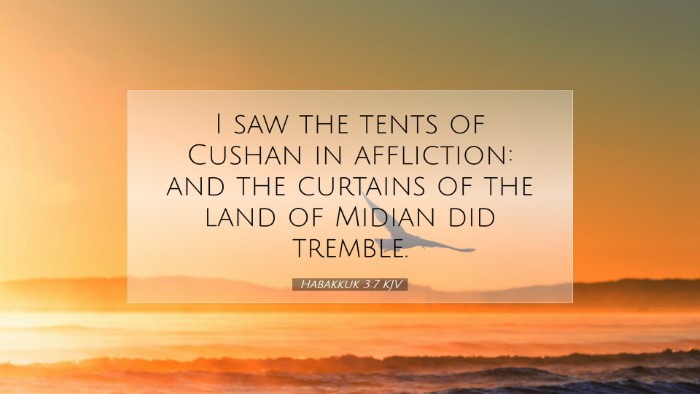Old Testament
Genesis Exodus Leviticus Numbers Deuteronomy Joshua Judges Ruth 1 Samuel 2 Samuel 1 Kings 2 Kings 1 Chronicles 2 Chronicles Ezra Nehemiah Esther Job Psalms Proverbs Ecclesiastes Song of Solomon Isaiah Jeremiah Lamentations Ezekiel Daniel Hosea Joel Amos Obadiah Jonah Micah Nahum Habakkuk Zephaniah Haggai Zechariah MalachiHabakkuk 3:7
Habakkuk 3:7 KJV
I saw the tents of Cushan in affliction: and the curtains of the land of Midian did tremble.
Habakkuk 3:7 Bible Commentary
Commentary on Habakkuk 3:7
In the book of Habakkuk, the prophet grapples with the profound realities of faith amidst societal turmoil. Habakkuk 3:7 states:
“I saw the tents of Cushan in affliction: and the curtains of the land of Midian did tremble.”
Contextual Overview
This verse is situated within a powerful prayer of the prophet in the third chapter of Habakkuk, which is predominantly a hymn of praise to God. The prophet recounts God’s mighty deeds and acknowledges His sovereignty, reflecting on the historical judgment God has executed upon nations. Here, Habakkuk remarks on the visible distress experienced by the Cushites and Midianites, highlighting a broader theme of God's authority over nations.
Insights from Commentaries
Matthew Henry’s Insights
Matthew Henry provides a rich understanding of the historical and figurative significance of “Cushan” and “Midian.” He notes:
- Cushan: Often thought to refer to the region corresponding to modern Ethiopia, which signifies the involvement of distant nations in the larger narrative of God’s judgment.
- Affliction: The word “affliction” denotes a state of suffering, suggesting that the effects of God’s judgment are felt even among those who are not directly implicated in Israel's rebellion.
- Trembling of Midian: The mention of the “curtains” or “tents” trembling illustrates the fear and apprehension of nations as they encounter the Lord’s might.
Albert Barnes’ Reflections
In his commentary, Albert Barnes emphasizes the prophetic vision displayed by Habakkuk:
- Vision of God's Power: Barnes argues that Habakkuk is led to witness not only Israel’s impending judgment but also the reaction of other nations — a testimony to God’s omnipotence.
- God’s Sovereignty over All Peoples: He highlights the notion that God's authority is universal, extending beyond borders, affecting the mightiest of kingdoms.
- Emotional Response: Barnes reflects on the emotional weight carried by Habakkuk as he perceives the tumult experienced by these nations.
Adam Clarke’s Analysis
Adam Clarke brings forth a doctrinal perspective in his analysis:
- Spiritual Significance: Clarke points out that the “tents of Cushan” may symbolize the transient and unstable nature of worldly powers when faced with divine intervention.
- Faith amidst Fear: Clarke notes that the trembling of the Midianite curtains can be seen as a metaphor for the fear that grips those who stand against God.
- Broader Implications: He posits that the tremors felt by these nations offer a reminder of the impending judgment on all who oppose God, a call to reverence for His holiness.
Theological Themes
This verse provokes several important theological themes for further reflection:
- The Nature of Divine Judgment: The insight into the affliction of Cushan and the trembling of Midian illustrates the extensive reach of God’s judgment — a cultivation of a reverent fear for the Lord.
- The Response of Nations to Divine Sovereignty: The reaction of foreign nations to God's power serves to reinforce the idea that God’s authority transcends Israel and resonates in the lives of all peoples.
- Historical Perspective on Faith: Habakkuk’s historical reflections offer contemporary believers an understanding of God’s consistent character, challenging them to maintain faith amidst societal chaos.
Pastoral Applications
In pastoral contexts, this verse provides profound applications:
- Encouragement in Trials: Just as the prophet witnesses the affliction of others, pastors can comfort congregations facing adversity with the assurance that God’s sovereignty encompasses all of creation.
- Call to Righteousness: The reminder of God’s judgment can serve as a catalytic call for believers to examine their lives in light of God’s holiness and righteousness.
- Community Awareness: Understanding the external turmoil faced by other nations encourages the church to engage in prayer and missional activities, fostering a spirit of global empathy.
Conclusion
The examination of Habakkuk 3:7 offers a multifaceted perspective rooted in historical, emotional, and theological dimensions. By drawing upon the rich insights of notable commentators, pastors, students, and scholars are equipped to delve deeper into the text’s implications, thus enriching their understanding and application in today’s world.


